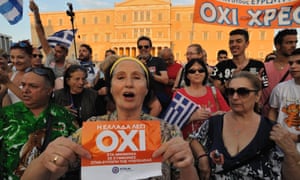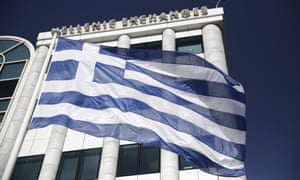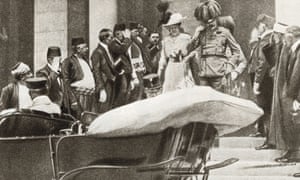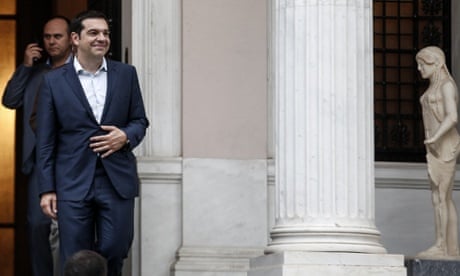The first German word I ever learned was Siemens. It was emblazoned on our sturdy 1950s fridge, our washing machine, the vacuum cleaner – on almost every appliance in my family’s home in Athens. The reason for my parents’ peculiar loyalty to the German brand was my uncle Panayiotis, who was Siemens’ general manager in Greece from the mid-1950s to the late 1970s.
A Germanophile electrical engineer and a fluent speaker of Goethe’s language, Panayiotis had convinced his younger sister – my mother – to take up the study of German; she even planned to spend a year in Hamburg to take up a Goethe Institute scholarship in the summer of 1967.
Alas, on 21 April 1967, my mother’s plans were laid in ruins, along with our imperfect Greek democracy. For in the early hours of that morning, at the command of four army colonels, tanks rolled on to the streets of Athens and other major cities, and our country was soon enveloped in a thick cloud of neo-fascist gloom. It was also the day when Uncle Panayiotis’s world fell apart.
Unlike my dad, who in the late 1940s had paid for his leftist politics with several years in concentration camps, Panayiotis was what today would be referred to as a neoliberal. Fiercely anti-communist, and suspicious of social democracy, he supported the American intervention in the Greek civil war in 1946 (on the side of my father’s jailers). He backed the German Free Democratic party and the Greek Progressive party, which purveyed a blend of free-market economics with unconditional support for Greece’s oppressive US-led state security machine.
His political views, and his position as the head of Siemens’ operations in Greece, made Panayiotis a typical member of Greece’s postwar ruling class. When state security forces or their stooges roughed up leftwing protesters, or even killed a brilliant member of parliament, Grigoris Lambrakis, in 1963, Panayiotis would grudgingly approve, convinced that these were unpleasant but necessary actions. My ears are still ringing with the rowdy exchanges he often had with Dad, over what he considered “reasonable measures to defend democracy from its sworn enemies” – reasonable measures that my father had experienced first-hand, and from which he would never fully recover.
The heavy footprint of US agencies in Greek politics, even going so far as to engineer the dismissal of a popular centrist prime minister, Georgios Papandreou, in 1965, seemed to Panayiotis an acceptable trade-off: Greece had given up some sovereignty to western powers in exchange for freedom from a menacing eastern bloc lurking a short driving distance north of Athens. However, on that bleak April day in 1967, Panayiotis’s life was turned upside down.
He simply could not tolerate that “his” people (as he referred to the rightist army officers who had staged the coup and, more importantly, their American handlers) should dissolve parliament, suspend the constitution, and intern potential dissidents (including rightwing democrats) in football stadia, police stations and concentration camps. He had no great sympathy with the deposed centrist prime minister that the putschists and their US puppeteers were trying to keep out of government – but his worldview was torn asunder, leading him to a sudden spurt of almost comical radicalisation.
A few months after the military regime took power, Panayiotis joined an underground group called Democratic Defence, which consisted largely of other establishment liberals like himself – university professors, lawyers, and even a future prime minister. They planted a series of bombs around Athens, taking care to ensure there were no injuries, in order to demonstrate that the military regime was not in full control, despite its clampdown.
For a few years after the coup, Panayiotis appeared – even to his own mother – as yet another professional keeping his head down, minding his own business. No one had an inkling of his double life: corporate man during the day, subversive bomber by night. We were mostly relieved, meanwhile, that Dad had not disappeared again into some concentration camp.
My enduring memory of those years, in fact, is the crackling sound of a radio hidden under a red blanket in the middle of the living room in our Athens home. Every night at around nine, mum and dad would huddle together under the blanket – and upon hearing the muffled jingle announcing the beginning of the programme, followed by the voice of a German announcer, my own six-year-old imagination would travel from Athens to central Europe, a mythical place I had not visited yet except for the tantalising glimpses offered by an illustrated Brothers Grimm book I had in my bedroom.
Deutsche Welle, the German international radio station that my parents were listening to, became their most precious ally against the crushing power of state propaganda at home: a window looking out to faraway democratic Europe. At the end of each of its hour-long special broadcasts on Greece, my parents and I would sit around the dining table while they mulled over the latest news.
I didn’t fully understand what they were discussing, but this neither bored nor upset me. For I was gripped by a sense of excitement at the strangeness of our predicament: that, to find out what was happening in our very own Athens, we had to travel, through the airwaves, and veiled by a red blanket, to a place called Germany.
The reason for the red blanket was a grumpy old neighbour called Gregoris. Gregoris was known for his connections with the secret police and his penchant for spying on my parents; in particular my Dad, whose leftwing past made him an excellent target for an ambitious snitch. Strange as it may sound today, tuning in to Deutsche Welle broadcasts became one of a long list of activities punishable by anything from harassment to torture. So, having noticed Gregoris snooping around inside our backyard, my parents took no risks. Thus the red blanket became our defence from Gregoris’s prying ears.
A few years later, it was from Deutsche Welle that we learned what Panayiotis and his colleagues had been up to – when the radio announced that they had all been arrested. Dad would joke for years to come about the pathetic inability of these bourgeois liberals to organise an underground resistance group: only a few hours after one of the Democratic Defence members was accidentally caught, the rest were also rounded up. All the police had to do was read the first man’s diary – where he had meticulously listed his comrades’ names and addresses, in some cases including a description of each subversive “assignment”. Torture, court martial and long prison sentences – in some cases the death sentence – followed.
A year after Panayiotis’s capture, the military police guarding him decided to relax his isolation regime by allowing me, a harmless 10-year-old, to visit him once a week. Our already close bond grew stronger with boy-talk that allowed him a degree of escapism. He told me about machines I had never seen (computers, he called them), asked about the latest movies, described his favourite cars.
In anticipation of my visits, he would use matchsticks and other materials that prison guards would let him keep to build model planes for me. Often, he would hide inside his elegant artefacts a message for my aunt, my mother, on occasion even for his colleagues at Siemens. For my part, I was proud of my new skill of disassembling his models with minimal damage, retrieving the message, and putting them back together.
Long after Panayiotis’s death, I discovered the last of these: a matchstick model of a Stuka dive-bomber in my old family home’s attic. Torn between leaving it intact and looking inside, I decided to take it apart. And there it was. His last missive was not addressed to anyone in particular.
It was a single word: “kyriarchia”. Sovereignty.

A tank outside the parliament building in Athens during the military coup in 1967. Photograph: Bettmann/Corbis
It was almost 50 years after those childhood evenings under the red blanket that I made my first official visit to Berlin as finance minister of Greece, in February 2015. My first port of call was, of course, the federal finance ministry, to meet the legendary Dr Wolfgang Schäuble. To him, and his minions, I was a nuisance. Our leftwing government had just been elected, defeating a sister party of the Christian Democrats – New Democracy – on an electoral platform that was, to say the least, a form of inconvenience for Schäuble and Chancellor Angela Merkel, and their plans for keeping the eurozone in order.
Our success was, indeed, Berlin’s greatest fear. Were we to succeed in negotiating a new deal for Greece that ended the interminable recession gripping the nation, the Greek leftist “disease” would almost certainly spread to Portugal, Spain and Ireland, all of which had general elections looming.
Before I arrived in Berlin, and only three days after I had assumed office as minister, I received my first high-ranking visitor in my Athens office: Schäuble’s self-appointed envoy, Jeroen Dijsselbloem, the Dutch finance minister and president of the Eurogroup of finance ministers. Within seconds of meeting, he asked me whether I intended to implement fully and unwaveringly the economic programme that previous Greek governments had been forced by Berlin, Brussels and Frankfurt – the seat of the European Central Bank (ECB) – to adopt.
Given that our government had won a mandate to renegotiate the very logic of that disastrous programme (which had led to the loss of one third of national income and increased unemployment by 20%), his question was never going to be the beginning of a beautiful friendship.
For my part, I attempted a diplomatic reply that would be my standard line of argument for the months to follow: “Given that the existing economic programme has been an indisputable failure, I propose that we sit down together, the new Greek government and our European partners, and rethink the whole programme without prejudice or fear, designing together economic policies that may help Greece recover.”
My modest plea for a modicum of national sovereignty over the economic policies imposed on a nation languishing in the depths of a great depression was met with astonishing brutality. “This will not work!”, was Dijsselbloem’s opening line. In less than a minute he had laid his cards on the table: if I were to insist on any substantial renegotiation of the programme, the ECB would close down our banks by the end of February 2015 – a month after we had been elected.
The Greek finance ministry’s office overlooks Syntagma Square and the House of Parliament – the very stage on which, in April 1967, the tanks had crushed our democracy. As Dijsselbloem spoke, I caught myself looking over his shoulder out to the broad square teeming with people and thinking to myself: “This is interesting. In 1967 it was the tanks, now they are trying to do the same with the banks.”
The meeting with Dijsselbloem ended with a tumultuous press conference in which the Eurogroup’s president lost his cool when he heard me say that our government was not planning to work with the cabal of technicians the troika of lenders habitually sent to Athens to impose upon the elected government policies destined to fail. The die had been cast and the battle for reclaiming part of our lost sovereignty was only beginning. Berlin, where I was to meet the troika’s real master, beckoned.
As the car that was driving me from Berlin’s Tegel airport approached the old headquarters of Goering’s air ministry – now the home of the federal ministry of finance – I wondered whether my host, Schäuble, could even begin to imagine that I was arriving in Berlin with my head full of childhood memories in which Germany featured as an important friend.
Once inside the building, my aides and I were ushered briskly into a large lift. The lift door opened up into a long, cold corridor at the end of which awaited the great man in his famous wheelchair. As I approached, my extended hand was refused and, instead of a handshake, he ushered me purposefully into his office.
While my relationship with Schäuble warmed in the months that followed, the shunned hand symbolised a great deal that is wrong with Europe. It was symbolic proof that the half-century that had passed since my red blanket days, and those prison visits to Siemens’ man in Athens, had changed Europe to no end.
I have no idea what role Siemens played in securing my uncle’s release some time in 1972, two years before the regime’s collapse. What I do know is that my parents were convinced that the German company had played a decisive role. For that reason, every time I saw the word “Siemens” around our home, I felt a warm glow. It is the same kind of warmth I still feel when I hear the words Deutsche Welle. Indeed, back then, in the exciting, bleak years of my childhood, Germany featured in my imagination as a dear friend, a land of democrats that, under Chancellor Willy Brandt, did what was humanly possible to help Greeks rid ourselves of our ugly dictatorship.
Returning home to Athens from my first official visit to Berlin, I was struck by the irony. A continent that had been uniting under different languages and cultures was now divided by a common currency, the euro, and the awful centrifugal forces that it had unleashed throughout Europe.
A week after our first bilateral meeting in Berlin, Schäuble and I were to meet again across the long, rectangular table of the Eurogroup, the eurozone’s decision-making body, comprising the common currency’s finance ministers, plus the representatives of the troika – the ECB, the European Commission, and the International Monetary Fund. After I had recited our government’s plea for a substantial renegotiation of the so-called “Greek economic programme”, which had the troika’s fingerprints all over it, Dr Schäuble astounded me with a reply that should send shivers up the spine of every democrat: “Elections cannot be allowed to change an economic programme of a member state!” he said categorically.
During a break from that 10-hour Eurogroup meeting, in which I had struggled to reclaim some economic sovereignty on behalf of my battered parliament and our suffering people, another finance minister attempted to soothe me by saying: “Yanis, you must understand that no country can be sovereign today. Especially not a small and bankrupt one like yours.”
This line of argument is probably the most pernicious fallacy to have afflicted public debate in our modern liberal democracies. Indeed, I would go as far as to suggest that it may be the greatest threat to liberal democracy itself. Its true meaning is that sovereignty is passé unless you are the United States, China or, maybe, Putin’s Russia. In which case you might as well append your country to a transnational alliance of states where your parliament is reduced to a rubber stamp, and all authority is vested in the larger states.
Interestingly, this argument is not reserved for small, bankrupt countries such as Greece, trapped in a badly designed common currency area. This same noxious dictum is today being peddled in the UK – supposedly as a clinching argument in favour of the remain campaign. As a supporter of Britain remaining in the EU, nothing upsets me more than the enlistment to the “yes” cause of an argument that is as toxic as it is woolly.
The problem begins once the distinction between sovereignty and power is blurred. Sovereignty is about who decides legitimately on behalf of a people – whereas power is the capacity to impose these decisions on the outside world. Iceland is a tiny country. But to claim that Iceland’s sovereignty is illusory because it is too small to have much power is like arguing that a poor person with no political clout might as well give up her right to vote.
To put it slightly differently, small sovereign nations such as Iceland have choices to make within the broader constraints created for them by nature and by the rest of humanity. However limited these choices might be, Iceland’s citizens retain absolute authority to hold their elected officials accountable for the decisions they have reached (within the nation’s external constraints), and to strike down every piece of legislation those elected officials have decided upon in the past.
An alliance of states, which is what the EU is, can of course come to mutually beneficial arrangements, such as a defensive military alliance against a common aggressor, coordination between police forces, open borders, an agreement to common industry standards, or the creation of a free-trade zone. But it can never legitimately strike down or overrule the sovereignty of one of its member states on the basis of the limited power it has been granted by the sovereign states that have agreed to participate in the alliance. There is no collective European sovereignty from which Brussels could draw the legitimate political authority to do so.
One may retort that the European Union’s democratic credentials are beyond reproach. The European Council comprises heads of governments, while Ecofin and the Eurogroup are the councils of finance ministers (of the whole EU and of the eurozone respectively). All these representatives are, of course, democratically elected. Moreover, there is the European parliament, elected by the citizens of the member states, which has the power to send proposed legislation back to the Brussels bureaucracy. But these arguments demonstrate how badly European appreciation of the founding principles of liberal democracy has been degraded. The critical error of such a defence is once more to confuse political authority with power.
A parliament is sovereign, even if its country is not particularly powerful, when it can dismiss the executive for having failed to fulfil the tasks assigned to it within the constraints of whatever power the executive and the parliament possess. Nothing like this exists in the EU today.
For while the members of the European Council and the Eurogroup of finance ministers are elected politicians, answerable, theoretically, to their respective national parliaments, the Council and the Eurogroup are themselves not answerable to any parliament, nor indeed to any voting citizens whatsoever.
Moreover, the Eurogroup, where most of Europe’s important economic decisions are taken, is a body that does not even exist in European law, that keeps no minutes of its procedures and insists its deliberations are confidential – that is, not to be shared with the citizens of Europe. It operates on the basis – in the words of Thucydides – that “strong do as they please while the weak suffer what they must”. It is a set-up designed to preclude any sovereignty derived from the people of Europe.
While opposing Schäuble’s logic on Greece in the Eurogroup and elsewhere, at the back of my mind there were two thoughts. First, as the finance minister of a bankrupt state, whose citizens demanded an end to a great depression that had been caused by a denial of our bankruptcy – the imposition of new unpayable loans, so payments could be made on old unpayable loans – I had a political and moral duty to say no to more “extend-and-pretend” loan agreements. My second thought was the lesson of Sophocles’s Antigone, who taught us that good women and men have a duty to contradict rules lacking political and moral legitimacy.
Political authority is the cement that keeps legislation together, and the sovereignty of the body politic that engenders the legislation is its foundation. Saying no to Schäuble and the troika was an essential defence of our right to sovereignty. Not just as Greeks but as Europeans.
How ironic that this should also have been the last missive I received from Siemens’ long forgotten man in Athens.

Supporters of a no vote in Greece’s referendum on its bailout, outside the Greek parliament in Athens last summer. Photograph: Nicolas Koutsokostas/Demotix/Corbis
Coming into the highest level of European decision-making from the academic world, where argument and reason are the norm, the most striking realisation was the absence of any meaningful debate. If this was not bad enough, there was an even more painful realisation: that this absence is considered natural – indeed, considered a virtue, and one that newcomers like myself should embrace, or face the consequences.
Prearranged communiques, prefabricated votes, a solid coalition of finance ministers around Schäuble that was impenetrable to rational debate; this was the order to the day and, more often, of the long, long night. Not once did I get the feeling that my interlocutors were at all interested in Greece’s economic recovery while we were discussing the economic policies that should be implemented in my country.
From the day I assumed office I strove to put together sensible, moderate proposals that would create common ground between my government, the troika of Greece’s lenders and Schäuble’s people. The idea was to go to Brussels, put to them our own blueprint for Greece’s recovery and then discuss with them their own ideas and objections to ours.
My own Athens-based team worked hard on this, together with experts from abroad, including Jeff Sachs of Columbia University, Thomas Meyer, a former chief economist at Deutsche Bank, Daniel Cohen and Matthieu Pigasse, leading lights of the French investment bank Lazard, the former US treasury secretary Larry Summers, and my personal friend Lord Lamont – not exactly a group of leftist recalcitrants.
Soon we had a fully-fledged plan, whose final version I co-authored with Jeff Sachs. It consisted of three chapters. One proposed smart debt operations that would make Greece’s public debt manageable again, while guaranteeing maximum returns to our creditors. The second chapter put forward a medium-term fiscal consolidation policy that would ensure the Greek government would never get into deficit again, while limiting our budget surplus targets to levels low enough to be credible and consistent with recovery. Finally, the third chapter outlined deep reforms to public and tax administration, product markets, and the restructure of a broken banking system as well as the creation a development bank to manage public assets at an arm’s length from politicians.
I am often asked: Why were these proposals of your ministry rejected? They were not. The Eurogroup and the troika did not have to reject them because they never allowed me to put them on the table. When I began speaking about them, they would look at me as if I were singing the Swedish national anthem. And behind the scenes they were exerting pressure on the Greek prime minister, Alexis Tsipras, to repress these proposals, insinuating that there would be no agreement unless we stuck to the troika’s failed programme.
What was really going on, of course, was that the troika could simply ignore our proposals, tell the world that I had nothing credible to offer them, let the negotiations fail, impose an indefinite bank holiday, and then force the prime minister to acquiesce on everything – including a massive new loan that is at least double the size Greece would have required under our proposals.
Tragically, despite our prime minister’s acceptance of the troika’s terms of surrender, and the loss of another year during which Greece’s great depression is deepening, the same process is unfolding now. Only a few days ago WikiLeaks revealed the troubling transcript of a telephone conversation involving the International Monetary Fund’s participants in the Greek drama. Listening to their discussion confirms that nothing has changed since I resigned last July.
Once I put it to Schäuble that we, as the elected representatives of a continent in crisis, can not defer to unelected bureaucrats; we have a duty to find common ground on the policies that affect people’s lives through direct dialogue. He replied that, in his perspective, what matters most is the respect of the existing “rules”. And since the rules can only be enforced by technocrats, I should talk to them.
Whenever I attempted to discuss rules that were clearly impossible to enforce, the standard reply was: “But these are the rules!” Once, while I was pushing hard for the argument, resulting from our team’s policy work, that primary budget surplus targets of 4.5% of Greece’s national income were impossible, and undesirable even from the creditors’ perspective, Schäuble looked at me and asked me, perhaps for the first and last time, an economic question. “So, what would you like that target to be?” At last, I rejoiced, a chance to have a serious discussion.
In an attempt to be as reasonable as possible, I replied: “For the target of the government budget primary surplus to be credible and realistic, it needs to be consistent with our overall policy mix. The budget surplus number, when added to the difference between savings and investment, must equal Greece’s current account balance. Which means that we can strive for a higher budget primary surplus if we also put in place a credible strategy for boosting investment and delivering more credit to exporters.
“So, before I can answer your question, Wolfgang, on what the primary surplus target ought to be, it is crucial that we link this number to our policies on non-performing bank loans (that impede credit to exporters) and investment flows (which are reduced when we set the primary budget surplus target too high, scaring investors off with the implicit threat of higher future taxes). What I can tell you at this point is that the optimal target cannot be more than 1.5%. But let’s have our people study this together.”
Schäuble’s response to my point, addressing the rest of the Eurogroup while avoiding my eyes, was remarkable: “The previous government has committed Greece to 4.5% primary surpluses. And a commitment is a commitment!”
A few hours later, the media was full of leaks from the Eurogroup, claiming that “the Greek finance minister infuriated his colleagues in the Eurogroup by subjecting them to an economics lecture”.

Wolfgang Schäuble and Yanis Varoufakis before a finance ministers’ meeting in Brussels in 2015 Photograph: Olivier Hoslet/EPA
There is a reason why I began this piece with the story of my Uncle Panayiotis. That reason is a question asked by a journalist towards the end of the press conference after my first meeting with Wolfgang Schäuble in Berlin.
The question was about Siemens and a scandal that had broken out some years earlier, when an investigation initiated in the US found evidence that a certain Michalis Christoforakos, a successor of Panayiotis, was actively pushing bribes into the hands of Greek politicians to secure government contracts on behalf of Siemens. Soon after the Greek authorities began investigating the matter, the gentleman absconded to Germany, where the courts prevented his extradition to Athens.
“Did you, minister,” asked the journalist, “impress upon your German colleague” – that would be Wolfgang Schäuble – “the German state’s obligation to help the Greek government snuff out corruption by extraditing Mr Christoforakos to Greece?” I tried to honour the question with a reasonable answer. “I am sure,” I said, “that the German authorities will understand the importance of assisting our troubled state in its struggle against corruption in Greece. I trust that my colleagues in Germany understand the importance of not being seen to have double standards anywhere in Europe.” Looking terribly put out, Schäuble mumbled that this was not a matter for his finance ministry.
On the aeroplane back to Athens, my mind travelled to the late 1970s. After his release from prison, Panayiotis returned to the helm of Siemens Greece. He was happy in that job, as he kept telling me, and proud of his work. Until he stopped being proud of it – so much so that he resigned in anger.
I remember asking him why he had resigned. His answer still resonates. He told me that he was facing pressure from his superiors in Germany to pay bribes to Greek politicians to ensure that Siemens would maintain its dominant position in Greece, getting the lion’s share of contracts related to the lucrative digitisation of the Greek telephone network.
There is a touching faith in the European north that Europe comprises ants and grasshoppers – and that all the frugal and cautious ants live in the north, while the spendthrift grasshoppers have congregated mysteriously in the south. The reality is much more muddled. A mighty network of corrupt practices has been laid over all of our countries – and the collapse of democratic checks and balances, due in part to our receding sovereignty, has helped hide it from public view.
As legitimate political authority retreats, we fall in the lap of brute force, inertia and demonisation of the weak. Indeed, by the end of June of 2015, the ECB had shut our banks, our government was divided, I resigned my ministry, and my prime minister capitulated to the troika.
The crushing of the Athens spring was a serious blow for an already wounded Greece. But it was also a wholesale defeat for the idea of a united, humanist, democratic Europe.
Our European Union is disintegrating. Should we accelerate the disintegration of a failed confederacy? If one insists that even small countries can retain their sovereignty, as I have done, does this mean Brexit is the obvious course? My answer is an emphatic “No!”
Here is why: if Britain and Greece were not already in the EU, they should most certainly stay out. But, once inside, it is crucial to consider the consequences of a decision to leave. Whether we like it or not, the European Union is our environment – and it has become a terribly unstable environment, which will disintegrate even if a small, depressed country like Greece leaves, let alone a major economy like Britain. Should the Greeks or the Brits care about the disintegration of an infuriating EU? Yes, of course we should care. And we should care very much because the disintegration of this frustrating alliance will create a vortex that will consume us all – a postmodern replay of the 1930s.
It is a major error to assume, whether you are a remain or a leave supporter, that the EU is something constant “out there” that you may or may not want to be part of. The EU’s very existence depends on Britain staying in. Greece and Britain are facing the same three options. The first two are represented aptly by the two warring factions within the Tory party: deference to Brussels and exit. They are equally calamitous options. Both lead to the same dystopian future: a Europe fit only for those who flourish in times of a great Depression – the xenophobes, the ultra-nationalists, the enemies of democratic sovereignty. The third option is the only one worth going for: staying in the EU to form a cross-border alliance of democrats, which Europeans failed to manage in the 1930s, but which our generation must now attempt to prevent history repeating itself.
This is precisely what some of us are working towards in creating DiEM25 – the Democracy in Europe Movement, with a view to conjuring up a democratic surge across Europe, a common European identity, an authentic European sovereignty, an internationalist bulwark against both submission to Brussels and hyper-nationalist reaction.
Is this not utopian? Of course it is! But not more so than the notion that the current EU can survive its anti-democratic hubris, and the gross incompetence fuelled by its unaccountability. Or the idea that British or Greek democracy can be revived in the bosom of a nation-state whose sovereignty will never be restored within a single market controlled by Brussels.
Just like in the early 1930s, Britain and Greece cannot escape Europe by building a mental or legislative wall behind which to hide. Either we band together to democratise – or we suffer the consequences of a pan-European nightmare that no border can keep out.








